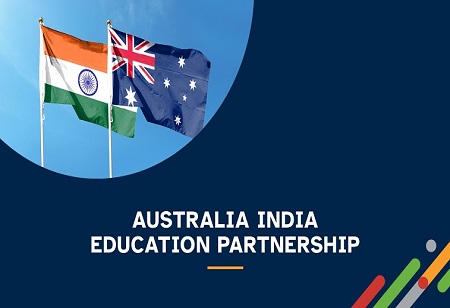-
Australia’s education minister Jason Clare led a delegation of higher education leaders to India for three days, meeting with his Indian counterpart Dharmendra Pradhan in Gandhinagar. Included in the plan are steps on how Australia will take to deepen its relationship with India such as through closer education and research partnerships, student mobility, and Australia-India alumni networks. Clare said the council is “important” and will help to strengthen the countries’ education relationship.
“These developments also highlight that international education is not a one-way street, it is not just about international students coming to Australia, it is increasingly about Australian universities going to the world”, he said, reiterating comments he made ahead of his trip. As well as celebrating the imminent opening of Deakin University and the University of Wollongong campuses in GIFT City, the delegation has also made signals to deepen operations in India.
Six Innovative Research Universities have signaled their intent to collectively establish a consortium campus in India, officials said, and Western Sydney University has also voiced an intent to establish an Indian campus in Bengaluru. Four new partnerships have been signed – two with Deakin and two with Monash University. Deakin has agreed partnerships with the National Skills Development Council and IIT Gandhinagar, while Monash University has signed with IIT Hyderabad and the International Centre of Excellence in Mining.
The first joint academy between Indian and Australian institutions offering Twinning, Joint Degree, and Dual Degree Programs is already underway between RMIT and BITS Pilani. Internationalization of education “allows Indian students to access world-class education and research opportunities and helps build bridges with other countries, as it also exposes students to new ideas and prospects and enhances the country’s soft power potential”, Pradhan. Speaking with local media, Clare noted that Australian institutions “already run courses in Indian universities”.
“Now, Australia has an opportunity to run campuses as well and educate more Indian students in India… but not everyone can come to Australia… You don’t have to come to Australia to get an Australian qualification. You can do it here in India and the two Australian campuses in GIFT City are great examples of that”, he said. “I hope that is just the start”. The Maitri Scholars Program for postgraduate STEM degree courses was also revealed this week. Some 45 students in areas of emerging sectors of advanced manufacturing, critical technology, critical minerals, and clean energy solutions will be supported over the next four years, with the Australian government backing the program with AUS$11.2 million.
Clare said the Maitri scholarship launch was “a key outcome of today’s meeting of the Australia India Education and Skills Council”. “The program will strengthen our education partnership with India by giving some of its brightest young researchers the opportunity to study at our world-class universities”, he added. Speaking at the Australia India Institute Annual Oration, Clare highlighted the “audaciousness” of India’s National Education Policy. “It will mean that by the middle of next decade, one in four people around the world that get a university degree will get it in India”, he said, praising its aims. By the 2050s, there will be 90 million students in university here in India, he continued.
“That is nation-changing stuff,” he said, likening the projections to how higher education has changed in previous decades. It will make the country “stronger, smarter, wealthier” while creating new jobs in different industries. The minister also spoke of ties and friendships between the two countries that go back “a long time”. “Today one in 26 Australians can trace their roots back to here,” he told the audience in Gandhinagar.
“Punjabi is the fastest-growing language in Australia. Hinduism is the fastest-growing religion. We have more Indian residents per capita than any other country in the OECD. And that living bridge has helped bind our two countries closer today than ever before”. The Australia India Institute has just seen its funding extended to 2026 and the Australian government has tasked it to “fund new research initiatives with positive systemic impacts on the bilateral research relationship”. Also speaking at the same event, Australia India Institute CEO Lisa Singh highlighted the International Automobile Centre of Excellence, the VET partnership between Australia’s Kangan Institute, the Government of Gujarat, and Maruti Suzuki as “indicative of the progress Australian education providers have made”.
The project sees automotive courses and teacher training programs delivered to 3,000 Indian students at a time. The Australia Researcher Cooperation Hub – India platform has supported 63 Australian and Indian research students since launching earlier this year, Singh added. “I think it’s fair to say that few relationships have undergone such a dramatic transformation in the last decade [as the India-Australia education relationship, and few have greater bipartisan support back home in Canberra,” she said. The next meeting of the Australia India Education and Skills Council be held in Australia in 2024.
🍪 Do you like Cookies?
We use cookies to ensure you get the best experience on our website. Read more...

